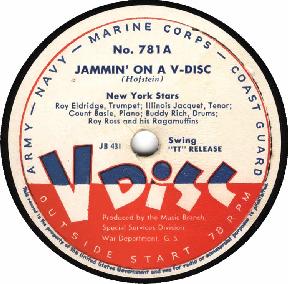
The National World War II Museum posted a nice item on the origin of "V-Discs," the U.S. government issued phonograph recordings made exclusively for the military. As the posted noted, V-Discs arose at a difficult time in the music industry.
The music industry was actually undergoing a war of its own during WWII. In 1942, two of the most prominent musician unions went on strike against all four recording companies in the U.S.. The strike then caused a shortage of music needed for troop morale. Yet, Lieutenant G. Robert Vincent had a solution to the problem. After approval of the U.S. government, he brokered a deal between the unions, recording companies, and the U.S. government. By agreeing to not distribute any records for commercial use, Vincent was able to get the recording companies to agree to record albums for the troops to listen to while at war. More amazingly, he also convinced top-name musicians in the business to record for the albums despite the strike they were involved in.Another by-product of this venture was that artists who were under contract with different record labels could record V-Discs together, resulting in collaborations that would not have been possible under their contracts.




No comments:
Post a Comment